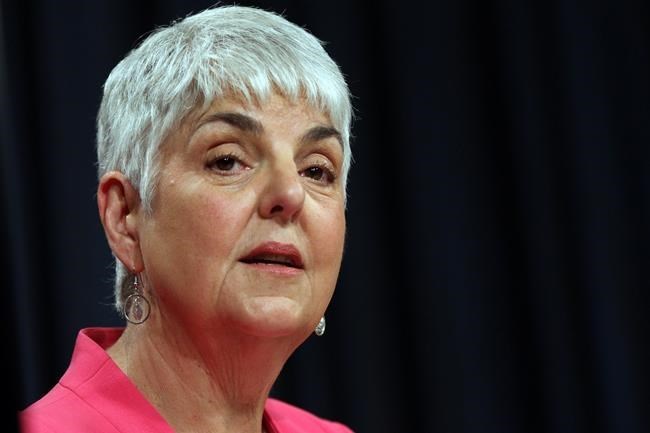VANCOUVER — The retail, food and restaurant sectors are calling for more help in the wake of new job numbers that show B.C. lost about 264,000 jobs in April.
New unemployment data from Statistics Canada shows a combined loss in March and April of almost 400,000 jobs in the province.
About half those job losses were in food services and the wholesale and retail sectors, Finance Minister Carole James said during a conference call on Friday.
"I mentioned when I presented the numbers in March that we expected the numbers would be worse in April," she said. "As predicted, today's data shows a staggering number of people are feeling the economic impact of COVID-19."
James wouldn't discuss what the pandemic's impact has been on B.C.'s budget, saying the province's first quarterly report will shed greater light on the damage.
She noted that when the province announced its budget in February, the unemployment rate stood at five per cent. It was at 11.5 per cent in April.
"I think we've got a hard road ahead," she said. "I don't want to sugar coat it."
The B.C. Restaurant and Foodservices Association says it conservatively estimates that 25 to 35 per cent of its industry may not reopen.
"We hope that's where the target is and it's not higher," said Ian Tostenson, the association's president.
Rent remains one of the biggest obstacles to restaurants across B.C. reopening, with Tostenson arguing rent relief should be extended to six months. That would help as restaurants begin to slowly restart and deal with reduced capacities and enhanced health measures.
"We can't live under capacity restrictions forever, there won't be an industry left," he said.
Greg Wilson, the B.C. director for the Retail Council of Canada, agrees with Tostenson's assessment.
The discretionary retail sector, which includes businesses ranging from toy stores to clothing shops, face more severe challenges than many understand, he said.
The council supports the food and restaurant association's call for more rent relief, particularly in high-rent cities like Vancouver.
"For that discretionary retail sector, this crisis is going to last until there's a vaccine," Wilson said. "That's a longer-term issue than a few months."
The province rolled out its restart plan on Wednesday, which would allow certain restaurants, health salons, retail outlets and museums to reopen in mid-May.
James said ministers are working with businesses in their respective portfolios to ensure their needs are being heard and addressed.
During an online town hall event on Friday, Premier John Horgan said he's pushing the federal government to cover the cost of paid sick leave so that workers feel secure staying home if they're unwell.
That's important both for consumer confidence and public safety, he said.
"If people are masking their symptoms because they have to pay their bills, they're putting themselves at risk, they're putting their colleagues at risk, they're putting their customers at risk," he said.
The federal employment insurance fund is the most appropriate bank for that, he said.
"We can't put the burden on companies that are coming out from underneath two months of no revenue."
Horgan is also pushing for federal transit funding, arguing that if commercial airlines are getting wage subsidies then public transportation systems should also get a boost.
Metro Vancouver's transit authority TransLink has said bus ridership has dropped 83 per cent and it's hemorrhaging $75 million a month. However, it announced on Friday it was rescinding layoff notices and reversing plans to cut service as it works out an emergency funding plan with the B.C. government.
The B.C. government is also working with cities to avoid any "bureaucratic restrictions" in expanding outdoor patio space, Horgan said.
This report was first published by the Canadian Press on May 8, 2020.
Nick Wells, The Canadian Press



